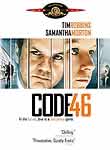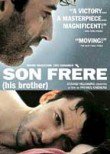 Code 46 (Michael Winterbottom, 2004)
Code 46 (Michael Winterbottom, 2004)I was a little hesitant to rent this, given its mixed reviews and Winterbottom's incredibly eclectic career, but I can't pass up cerebral sci-fi, and I usually enjoy movies like this even if they aren't objectively all that good. I'm really glad I decided to take a chance on this movie, though, because it turned out to be fabulous, reminiscent of thoughtful sci-fi movies like Eternal Sunshine of the Spotless Mind and Gattaca (which not coincidentally are two of my favorite films). I was sort of surprised to find that neither Winterbottom nor writer Frank Cottrell Boyce (who is a frequent Winterbottom collaborator) have any sci-fi background, since this movie seems to intuitively understand what makes the best science fiction. They give the audience just enough info to get by, but they never deal with mounds of exposition or didactic explanations of all the whys and wherefores of their future world. You figure things out by context, or sometimes you don't figure them out at all; in that way it's like trying to make your way in a foreign city. By eschewing most CGI and shooting in modern cities (mostly Shanghai), Winterbottom creates a future world that looks very much like an extrapolation of the present day, and thus his speculations have real grounding in current issues like genetic engineering, insurance and the divide between the rich and the poor. Not everything makes perfect logical sense, but neither do all of the laws and customs we have today. The central love story is affecting but seems at times artificial; I think that, rather than a flaw of the film, this is intentional, since it's never quite clear whether the main characters (played by Tim Robbins and Samantha Morton) fall in love naturally or thanks to some enhancement. Really a fascinating film, one I like more the more I think about it. It almost makes me disappointed that Winterbottom is so stylistically diverse, since he probably won't be tackling sci-fi again any time soon.
 The Edukators (Hans Weingartner, 2004)
The Edukators (Hans Weingartner, 2004)Given what I had read in reviews, I was sort of expecting this to be a left-wing diatribe, and while it was that at times, it had an interesting balance to it that I thought could have been more extensively explored. Not that this movie needed more extensive anything - it was far too long and meandering, and the interesting bits were mostly outweighed by the tedium. As an examination of youthful idealism it had some interesting moments, but as a drama (and especially with regards to the core love triangle) it was fairly weak.
 Son Frere (Patrice Chereau, 2003)
Son Frere (Patrice Chereau, 2003)Man, what a depressing movie. Basically this is about the slow deterioration and death (due to rare blood disease) of a not very pleasant French guy, and the way it affects his brother (and, to a lesser degree, his parents and girlfriend). That makes it sound awful, and while it's not necessarily fun to watch, it is one of the more harrowing and truthful portraits of illness I've seen. The long, incredibly uncomfortable scene of the main character sitting as his brother is shaved by nurses in preparation for surgery is really powerful and sad, which is exactly what you could say about the movie.
 The White Countess (James Ivory, 2005)
The White Countess (James Ivory, 2005)A counterpart to Code 46 in a way, since both are set in sort of mythical versions of Shanghai. This takes place in 1936, during the lead-up to World War II, and while it doesn't shy away from history, you can't shake the feeling that there's some serious romanticizing going on here. Which, as far as I'm concerned, is fine: Ivory and genius cinematographer Christopher Doyle make Shanghai look like the most amazing place on Earth at that particular time, and Ralph Fiennes and Natasha Richardson are the perfect pair to carry off 1930s glamour. The story is a little staid and the movie definitely drags, but it's a perfectly respectable send-off for the collaboration between Ivory and producer Ismail Merchant, who died last year.
No comments:
Post a Comment